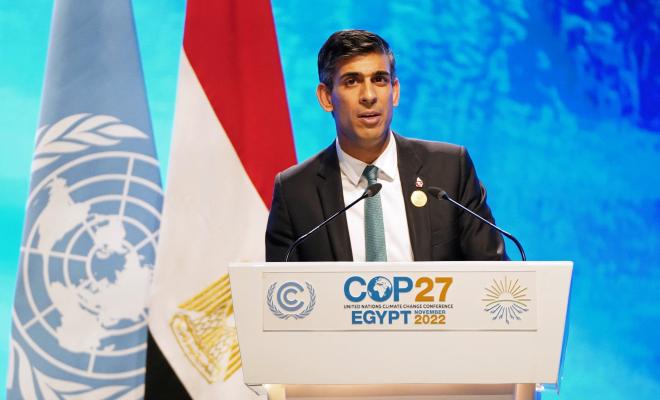Mike Childs07 Jul 2023
In 2022 we successfully took the government to court because its strategy to deliver on legally binding carbon reductions wasn't fit for purpose. As a result it was forced to publish a new strategy in March 2023.
The Climate Change Committee (CCC), the government’s official advisors, has just given its verdict on this new strategy and it’s not pretty reading for the government. It says there are only credible policies for less than a fifth of the emissions reductions needed.
So we've decided we need to take the government to court again. Here I set out the real-world context behind our decision and why we think legal action is necessary, along with a short summary of some of the CCC’s damning conclusions. With climate chaos evident around the world and our children’s future in jeopardy, we can’t allow the government to get away with publishing another unacceptable strategy.
Recent warnings of a terrifying tomorrow, and today
I’ve been following what scientists have been saying on climate change for more decades than I care to admit. Over this time the warnings have got louder. But more than that, what were once theoretical, predicted impacts based on complex computer models are now warnings based on real-life observations. From the extreme heat we experienced last year in the UK, to pictures of a third of Pakistan under water, to the wildfires raging through Canada right now, these terrifying predictions are already happening.
To be clear, scientists are saying that the reality of the climate crisis is worse than their computer models projected, worse than they feared. Over the last year, they’ve told us that:
- Climate change is driving a rise in record-shattering heatwaves that break existing temperature records by unprecedented margins. For example, the 2021 Pacific Northwest heatwave broke long-standing temperature records across much of the US and Canada by as much as 5 °C. Researchers show that 41 regions around the world, or 31% of the planet’s surface, have experienced what they call statistically implausible heat since 1959.
- Extreme rainfall that triggered deadly flooding across West Africa this year was made about 80 times more likely by human-caused climate change. The flooding killed more than 800 people in Nigeria, Niger, Chad and other neighbouring countries between June and October. In Nigeria alone, the floodwater displaced 1.3 million people and damaged more than 1 million hectares of farmland.
- The duration of snow cover in the Alps is now 36 days shorter than average compared with the last 600 years, with an unprecedented decline over the last 2 decades. Millions of people depend on meltwater from the Alps for agricultural, industrial and domestic purposes. Less snow means longer periods without it. Separate research tells us that two-thirds of glaciers worldwide could disappear entirely by 2100 if current trends continue, which would be disastrous for the billions of people around the world who depend on glacier meltwater.
Climate chaos is already with us. Without urgent action to significantly reduce emissions, the consequences for people and planet will be staggering. By 2100, 50-75% of the global population could be exposed to periods of extreme heat and humidity that are life-threatening. And the 3.6 billion people living in countries with low and lower-middle incomes, those who’ve contributed least to the climate crisis, will bear the brunt of these extreme conditions.
Is the UK’s Carbon Budget Delivery Plan wilfully negligent?
It’s now impossible for any politician to say, “I wasn’t warned”. Scientists, activists and independent expert advisors have made sure of that.
So when the Secretary of State for Energy Security and Net Zero, Grant Shapps, signed off on the government’s Carbon Budget Delivery Plan (previously called the Net Zero Strategy) in March 2023, he would have known how high the stakes are and how severe the consequences for life on our planet will be, should we fail to deliver sufficient emissions cuts.
Yet he still signed off on a plan that admitted the policies within it wouldn’t in fact deliver on the international commitment on carbon reduction reiterated by Prime Minister Rishi Sunak at COP27 just 4 months earlier.
The plan is also highly unlikely to deliver on the legally binding carbon reduction goals set by the UK Climate Change Act 2008 (CCA). This isn’t just Friends of the Earth’s view. It’s the expert analysis of the government’s own official climate advisors, the CCC. The CCC produces an annual report on the government’s climate performance and forward plans. Its 2023 Progress Report to Parliament, published on 28 June, says it’s less confident that reduction targets will be met than it was last year, even though last year it said the government only had credible plans to achieve 39% of the emission cuts needed. This year it dropped to a woeful 19%. A summary of the CCC report is provided below (see "What the Climate Change Committee thinks").
Time to go to court, again
Along with Client Earth and the Good Law Project, we took the government to court in 2022 because its Net Zero Strategy failed to provide the necessary level of information for parliament and the public to assess whether its plans would meet carbon reduction targets. The judge agreed and told the government to publish a new strategy by 31 March 2023. It published its new strategy on 30 March, this time calling it a Carbon Budget Delivery Plan.
We’ve assessed the new plan. Given the duties in the CCA, we still don’t think it includes the detail that it should, particularly on the levels of risk and confidence around delivering its policies. Especially given that the judge in our 2022 court case emphasised how crucial information on risk to delivery was.
Ultimately, we don’t think the Secretary of State should have signed off on the strategy because we don’t think he could legitimately have said that the plan will enable carbon reduction targets to be met. The strategy is based on the assumption that all of the policies will be delivered in full, but our view is that many of them have a high risk of failure. We’re even more certain of this now the CCC has given its verdict.
So we’re taking the government to court again. We’ve filed our papers with the High Court, and if a judge says the case can go ahead, we’ll expect the hearing this autumn or winter. We’re asking the Court to once again uphold the CCA and order the government to produce a strategy that meets its climate obligations.
What the Climate Change Committee thinks
Because the CCC is an official independent expert body, its view matters. And it certainly does its homework. Its latest Progress Report runs to 438 pages.
The following summarises a selection of the CCC’s findings. You can also read the report in full.
- Only a small proportion of the government’s emissions reduction plans are credible. Graph 1 (below) compiles the data from the Committee’s report. It shows that for the big emitting sectors (buildings, electricity generation, transport and industry), a large proportion of the emissions cuts needed from them have policies that are at significant risk of failure, or have insufficient plans. In other words, there's a good chance that the emissions cuts won’t happen in practice, at least not in full. For some other sectors, such as aviation, waste, agriculture and land use, there are no credible plans at all.
- Airport expansion plans need to stop. Numerous airports around the country are looking to expand. The CCC is clear that the only way one airport can expand is if another one shrinks - and unsurprisingly there aren’t any offering to do that.
- The UK is no longer an international climate leader. It’s debatable that it ever was a genuine leader, particularly since the fall in consumption-based emissions (which include the carbon footprint of our imports and exports) is much smaller than the fall in territorial emissions (those released just in the UK). The government is always quick to shout about the latter, which have dropped by 39% since 1996, but the former have only dropped by 14%. And the government’s granting of planning permission for a new coal mine in Cumbria, as well as its enthusiasm for more oil and gas extraction, has shattered the leadership role that successive governments have claimed.
- In another blow to international leadership pretentions, the CCC is very worried that the UK will fail to meet its internationally promised goal to cut emissions by 68% by 2030, compared to 1990 levels. It’s way off track and 2030 is only 7 years away. This failure shatters Rishi Sunak’s promise to bring integrity to government, given he went to the 2022 international climate talks (COP27) and reiterated this pledge, which was first made by Boris Johnson in 2021 at COP26. It also looks like the government is planning to break promises on international climate finance as well.
- Plans to reduce the polluting gas methane, which in the UK comes largely from livestock, aren’t fit for purpose. A pledge by nations to cut methane by 30% by 2030 was one of the big wins from COP26 in Glasgow. The fact that the UK government had a key role in securing this and is doing so little to meet it speaks volumes to a worrisome trend by this government to make big announcements but not follow through. It also illustrates the almost total disengagement of the Department of Environment, Food and Rural Affairs from climate change.
- Our homes need retrofitting if we have any chance of meeting carbon reduction goals. The Committee laments the failure to bring forward higher energy standards for the private-rented sector and the glacial pace at which heat pumps are being rolled out. It also says the government hasn’t got a plan to help people not in fuel poverty retrofit their homes (some people experiencing fuel poverty will receive retrofit support), which it warns is the most significant policy gap. It notes that there’s been no substantive reduction in emissions from buildings since 2010. The scale of this failing is why Friends of the Earth has its United for Warm Homes campaign, which is calling for a government-funded, street-by-street programme of retrofits.
- Transport remains a sector that lags behind. Despite a faster uptake of electric cars than envisaged, the pace of change of vans switching to electric is too low, and there appears to be a lack of commitment to encourage and enable people to get out of their cars and into cycling, walking or public transport. This lacklustre support for public transport won’t come as a surprise to bus users witnessing savage cuts in services. The government appears to think it’s all about electric vehicles, even though, as the CCC points out, charging points aren’t being rolled out fast enough.
- Onshore wind can be built fast, but again the CCC comes back to a point made repeatedly in previous progress reports, that the de facto ban on onshore wind in England is holding back the transition to low-carbon electricity. It's far from convinced that the government has a plan to meet its own goal to decarbonise electricity by 2035.
- Tree planting rates are too low. The CCC says delays in planting trees and restoring peatlands severely jeopardise the potential for land becoming an important sink for carbon emissions by the mid-2030s, by absorbing more emissions than are released.
Graph 1 – CCC credibility assessment of the government’s carbon reduction plan for meeting 6th carbon budget (2033-2037)
What next?
We must live in hope that the government will read the CCC report, undergo a damascene conversion on the need to look after the only planet and home that we have and publish a plan to meet the climate crisis that's fit for purpose. Alternatively, if this doesn’t happen, we hope the courts will uphold our legal challenge and force the government to produce a credible plan.





